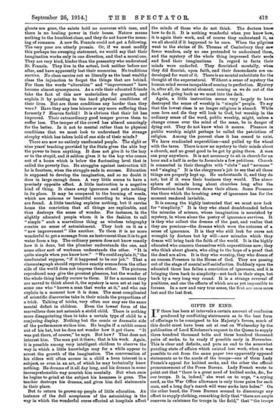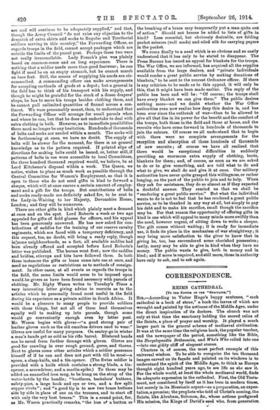GIFTS IN KIND.
IF there has been at intervals a certain amount of confusion produced by conflicting statements as to the best form of offerings to be consigned to his Majesty's forces, much of this doubt must have been set at rest on Wednesday by the publication of Lord Kitchener's request to the Queen to supply three hundred thousand belts and three hundred thousand pairs of socks, to be ready if possible early in November. This is clear and definite, and puts an end to the somewhat puzzling state of affairs which existed last week, when it was possible to cut from the same paper two apparently opposed statements as to the needs of the troops—one of them Lady French's appeal for knitted socks, and the other the official pronouncement of the Press Bureau. Lady French wrote to point out that " there is a great need of knitted socks, &c., for our troops. It is, indeed," she went on to urge, " a crying need, as the War Office allowance is only three pairs for each man, and a long day's march will wear socks into holes." On the other hand, the Press Bureau seemed to discourage any effort to supply clothing, remarking drily that "there are ample reserves in existence for troops in the field," that " the troops
are and will continue to be adequately supplied," and that, though the Army Council " do not raise any objection to the despatch of extra shirts and socks to Regular and Territorial soldiers serving in this country," the Forwarding Officer, as regards troops in the field, cannot accept packages which are outside the limits of the parcel post. Perhaps these two were not really irreconcilable. Lady French's plea was plainly based on common-sense and on long experience. There is nothing that a soldier needs more than good footwear; he can fight if need be on an empty stomach, but he cannot march on bare feet. Still, the means of supplying his needs are cir- cumscribed. A commanding officer can make arrangements for accepting eartloads of goods at a depot ; but a general in the field has to think of his transport with his supply, and though he might be grateful for the stock of a dozen drapers' shops, he has to move his troops besides clothing them, and be cannot pull unlimited quantities of flannel across a con- tinent. We were presumably meant, then, to understand that the Forwarding Officer will arrange for small parcels when and where he can, but that he does not undertake to deal with extra clothing in bulk. However, as to immediate possibilities there need no longer be any hesitation. Hundreds of thousands of belts and socks are needed within a month. The socks will be forthcoming at once, we have no doubt. The supply of belts will be slower for the moment, for there is no general knowledge as to the pattern required. If printed slips of directions for making belts could be issued, or, better still, if patterns of belts in use were accessible to local Committees, the three hundred thousand required would, we believe, be at Lord Kitchener's disposal within a week. The Queen, we notice, wishes to place as much work as possible through the Central Committee for Women's Employment, so that it is open to those who do not send gifts in kind to forward a cheque, which will at once ensure a certain amount of employ- ment and a gift for the troops. But contributions of belts and socks ready-made are definitely asked for, to be sent to the Lady-in-Waiting to her Majesty, Devonshire House, London; and they will be numerous.
There are other gifts in kind which plainly meet a demand at once and on the spot. Lord Roberts a week or two ago appealed for gifts of field glasses for officers, and his appeal has been generously answered. He has now asked for con- tributions of saddles for the training of our reserve cavalry regiments, which are faced with a temporary deficiency, and this request, too, no doubt, will bring a ready reply, though in:sorne neighbourhoods, as a fact, all available saddles had been already offered and accepted before Lord Roberta's letter was published. The horses went first; now the saddles and bridles, stirrups and bits have followed them. In both these instances the gifts or loans come into use at once, and need no regulations or restrictions as to methods of consign- ment. In other cases, at all events as regards the troops in
the field, the same limits would seem to be imposed upon would-be givers as have been found necessary with parcels of clothing. Mr. Rigby Wason writes to Tuesday's Times a
very interesting letter giving advice to recruits as to the articles which he personally found most useful in the field during his experience as a private soldier in South Africa. It would be a pleasure to many people to provide soldiers with these things, but not all of them lend themselves equally well to making up into parcels, though some would go conveniently enough even by letter post.
Mr. Wason begins with gloves—"a good strong pair of leather gloves such as the old omnibus drivers used to wear."
Gloves are useful for many purposes. On sentry-go in winter a man's hands get as cold as his rifle barrel. Blistered hands can be saved from further damage with gloves. Gloves are good for crawling in over rough ground, gorse, and thorns.
Next to gloves come other articles which a soldier possesses himself of if he can and does not part with till he must—a spoon, a clasp-knife, and a tin-opener. (The Swiss soldier is provided with a knife which contains a strong blade, a tin- opener, a screwdriver, and a marlin-spike.) To these may be added an enamelled iron mug, to be hung on the strap of the water-bottle by the handle; "bootlaces, bachelors' buttons, safety-pins, a large hook and eye or two, and a few split
copper rivets" ; and "a good tip is to sew two brace buttons side by side in place of one on the trousers, and to start off with only the very beat braces." This is a sound point, for, as Mr. Wason practically remarks, "the loss of a button or the breaking of a brace may temporarily put a man quite out of action." Should not braces be added to lists of gifts in
kind? Less essential, but obviously desirable, are folding pocket scissors (well made) and oiled silk for carrying papers in the pocket.
We come finally to a need which is so obvious and so easily understood that it has only to be stated to disappear. The Press Bureau has issued an appeal for blankets for the troops.
The War Office, we are informed, has acquired all the supplies available from the large dealers, and "private individuals
would render a great public service by making donations of blankets," to be sent to the nearest Ordnance officer. If there is any criticism to be made as to this appeal, it will only be this, that it might have been made earlier. The reply of the public has been and will be : " Of course; the troops shall have every blanket we can give them." The public desires nothing more—and we doubt whether the War Office authorities even now realize how deep this desire is, and has been ever since the outbreak of war—than to be allowed to give all that lies in its power for the benefit and the comfort of the troops, both those in the field and those at home, and the recruits who have come forward in hundreds of thousands to join the colours. Of course we all understand that to begin with there were no complete arrangements for the reception and absorption of these hundreds of thousands of new recruits ; of course we have all realized that there would be exceptional difficulties in suddenly providing an enormous extra supply of clothing, boots, blankets for them; and, of course, as soon as we are asked to do or to give something, and are told what to do and what to give, we shall do and give it at once. Our military authorities have never quite grasped this willingness, or rather longing, on the part of the public to join and to help. When they ask for assistance, they do so almost as if they expected a doubtful answer. They remind us that we shall be "rendering a great public service." But what the individual wants to do is not to feel that he has rendered a great public service, or to be thanked in any way at all, but simply to pay his debt and to make his sacrifice, small though the sacrifice may be. For that reason the opportunity of offering gifts in kind is one which will appeal to many minds more swiftly than the need, however urgent, of sitting down to write a cheque. The gift comes without waiting ; it is ready for immediate use, it finds its place in the mechanism of war straightway ; it may bring more satisfaction to the giver to know that in giving he, too, has surrendered some cherished possession; lastly, many may be able to give in kind when they have no money. The public wants to give, both in money and in kind ; and if more is required, and still more, those in authority have only to ask, and to ask again.



































 Previous page
Previous page